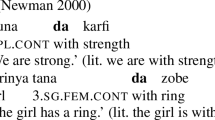Abstract
The purpose of this paper is to provide a simple type-free set theory which can be used to give the various readings of collective/distributive sentences.
Similar content being viewed by others
References
Aczel, P., 1980, “Frege structures and the notions of proposition, truth and set,” inThe Kleene Symposium, Barwise et al., eds.,Studies in Logic 101, 31–60, New York: North-Holland.
Kamareddine, F., 1988A,Semantics in a Frege structure; PhD thesis, University of Edinburgh.
Kamareddine, F., 1992A, “λ-terms, logic, determiners and quantifiers,”Journal of Logic, Language and Information 1, 79–103.
Kamareddine, F., 1992B, “Set Theory and Nominalisation, Part I,”Journal of Logic and Computation 2, 579–604.
Kamareddine, F., 1992C, “Set Theory and Nominalisation, Part II,”Journal of Logic and Computation 2, 687–707.
Kamareddine, F., 1992D, “A system at the cross roads of functional and logic programming,”Science of Computer Programming 19 239–279.
Kamareddine, F., and Klein, E., 1993, “Nominalisation, Predication and Type containment,”Journal of Logic, Language and Information 2, 171–215.
Kamareddine, F.,1995,A framework of Logic and Polymorphism, in preparation.
Landman, R., 1989, “Groups I & II”,Linguistics and Philosophy 12, 559–605, and 723–744.
Link, G., 1983, “The logical analysis of plural and mass terms: A lattice theoretic approach,” pp. 302–323 inMeaning, Use and Interpretation of Language, De Gruyter.
Link, G., 1986, “Generalised quantifiers and plurals,”CSLI, 86–67.
Scha, 1981, “Distributive, collective and cumulative quantification,” inFormal Methods in the Study of Language, Groenendijk, Janssen, and Stokhoh (eds.), Amsterdam: Mathematical Centre Tracts.
Scott, D., 1975, “Combinators and Classes,” pp. 1–26 inLambda Calculus and Computer Science, Corredo Böhm, ed., LNCS 37, Springer.
Author information
Authors and Affiliations
Additional information
Part of this work was carried out while the author was on a study leave for one year at the Technical University of Eindhoven, the Netherlands. I am grateful to the University of Eindhoven for their hospitality, financial and academic support. Moreover, I am grateful to the anonymous referees for their useful suggestions and comments. Last but not least I would like to thank Kieran Clenanghan for having commented on the style of the paper and Gerry Seligman for having drawn my attention to the problem faced by complex predicates.
Rights and permissions
About this article
Cite this article
Kamareddine, F. A type free theory and collective/distributive predication. J Logic Lang Inf 4, 85–109 (1995). https://doi.org/10.1007/BF01048616
Received:
Revised:
Issue Date:
DOI: https://doi.org/10.1007/BF01048616




